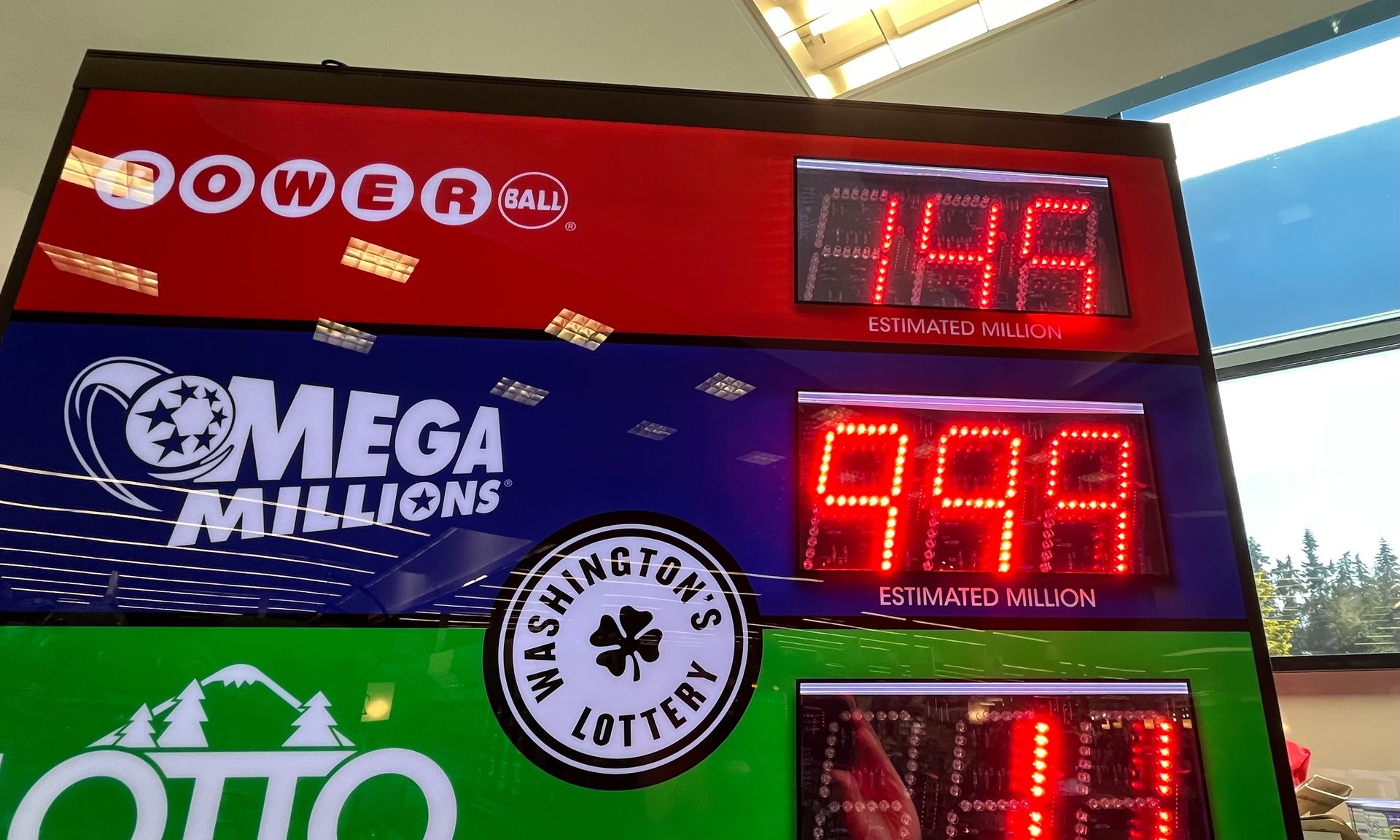How Lotteries Work (and How Much You Keep If You Win)
The winner won't see the full amount — at least not all at once. Here's how to play, and what it means if you win.

Many, or all, of the products featured on this page are from our advertising partners who compensate us when you take certain actions on our website or click to take an action on their website. However, this does not influence our evaluations. Our opinions are our own. Here is a list of our partners and here's how we make money.
As eye-popping as a big lottery prize might be, the winner doesn’t get to keep all of it once lottery formulas and tax collectors have their say. If you’re taking a chance on winning the ultimate jackpot, here’s what to know.
How you win the lottery
Winning the lottery starts with buying a ticket. Each player picks a set of six numbers that they hope will be randomly selected during the next drawing. The jackpot is split between anyone whose ticket matches all six numbers.
If no one picks the right set of numbers, no one wins, and the jackpot continues to grow until the next drawing. That means if you want a chance to win the bigger prize, you have to buy a new ticket.
The biggest prizes are awarded in Mega Millions and Powerball.
How to play Mega Millions
Mega Millions can be played in 45 U.S. states, as well as Washington, D.C., and the U.S. Virgin Islands. Drawings take place twice a week, on Tuesdays and Fridays.
Each ticket requires you to pick five numbers between 1 and 70, and a sixth number between 1 and 25 (or, you can let the lottery folks generate the numbers for you). Your odds of picking the winning numbers are roughly 1 in 290 million.
Tickets cost $5. The price went up in April 2025 as part of an overhaul of the game designed to improve players’ odds and give away bigger prizes.
How to play Powerball
You can play Powerball in 45 states, plus Washington, D.C., Puerto Rico and the U.S. Virgin Islands. Drawings are broadcast live every Monday, Wednesday and Saturday at 10:59 p.m. Eastern time.
Tickets cost $2. To play, pick five numbers between 1 and 69 and a Powerball number from 1 to 26 (or have them randomly generated). The odds of picking all six numbers correctly are about 1 in 292 million.
Meet MoneyNerd, your weekly news decoder
So much news. So little time. NerdWallet's new weekly newsletter makes sense of the headlines that affect your wallet.
Lottery payout options: Annuity or cash?
Jackpot winners can choose one of two ways to get their winnings: They can get the full prize spread out in payments over 29 years (called the annuity option) or take a smaller one-time lump sum. That’s known as the cash option.
The lottery annuity option
When Mega Millions advertises a big jackpot, like the $1.269-billion prize won in December 2024, it doesn’t have that sum sitting in a vault, ready to be handed to the next winner. Instead, lottery jackpots are calculated based on how much money you’d get if the sum of the current prize pool were invested in an annuity for three decades. That means you would eventually get the full sum, but it would take 30 years.
With the annuity option, you would receive a first payment when you win, followed by 29 annual payments that increase each year by 5%. If you were to die before all the annual payments were made, the rest would become part of your estate.
Powerball doesn’t specify the size of its first annuity payment. But if you won a Mega Millions jackpot and selected the annuity option, your first payment would be roughly 1.5% of the jackpot, according to the Mega Millions website. For a jackpot of $1.269 billion, that comes to a little more than $19 million. The payout would get 5% bigger each year after that.
The cash option
The cash option is based on what the lottery has in its prize pool on the day of the draw. For the $1.269 billion Mega Millions jackpot, the cash option was $571.9 million, which is a little less than half the jackpot.
But if you chose the cash option and invested the winnings, you could end up earning more than you would with the annuity option. For example, the average stock market return is roughly 10% per year before inflation.
The cash option is the most common choice among lottery winners, according to a list of past Powerball winners.
Stress less. Track more.
See the full picture: savings, debt, investments and more. Smarter money moves start in our app.
Paying taxes on lottery winnings
If you win nearly a billion dollars in the lottery, you definitely owe federal income tax on it. To start, 24% of your winnings are withheld for the IRS. How much that is depends on whether you went for the cash or annuity option, since you only pay taxes on what you receive in a given year.
If you won the Mega Millions jackpot and took the cash option of $571.9 million, you’d see a little more than $137 million withheld for federal income taxes, leaving you with nearly $435 million. Come tax time, you’d likely owe additional federal income taxes.
State taxes are another matter. If you buy a lottery ticket and win in your home state, you’ll owe state income taxes, if your state collects them. How much you’d owe would be determined when you file your state income tax return. Your state will take into account what you already paid. You can estimate the numbers on your big win with our lottery tax calculator.
If you buy a ticket and win while traveling out of state, you could be taxed in both places (again, assuming both states have an income tax). That’s because the state where you purchased the ticket likely will withhold taxes when you win.
How much you’d pay in state taxes, especially if you bought the ticket in another state, can be complicated. If you find yourself in this scenario, talk with a tax accountant to sort it out.
Where lottery prizes come from
Lottery prizes are funded through ticket sales. And that’s one reason jackpots have grown so large. Lottery players are spending more and more on tickets each year, hoping to win it all.
In 2023, players spent more than $113.3 billion on lottery tickets in the U.S., according to the North American Association of State and Provincial Lotteries. That’s up from $73.8 billion in 2015.
Where lottery revenue goes
The lotteries association estimates that 65% of revenue from ticket sales goes into the prize pool, and 24% is used for state initiatives.
Each state decides how to distribute its lottery revenue to selected initiatives. For example, Florida uses a portion of lottery sales to fund public education, according to the Florida Lottery website.
As for the rest of the total revenue, the lotteries association estimates 5% is used to cover lottery operating costs, and another 6% is paid to retailers as commission.
How to claim lottery winnings
Each participating state has its own rules about how to claim a Powerball or Mega Millions reward. In fact, the length of time you have to file your claim ranges from 90 days to a year from the date the numbers were drawn. Make sure you review the rules in the state where you purchased the ticket.
What to do if you win the lottery
If you win the lottery, your first priority is to protect your ticket. Whoever possesses a winning lottery ticket gets to claim the award. If you’re part of a lottery pool, you should have a written record of who’s part of the group, so it’s clear who gets a piece of the prize.
Next, consider your anonymity. Each state has its own laws about whether lottery winners have to be publicly identified. Keeping your name out of the news and telling as few people as possible protects you from scammers and long-lost “friends” who want to get back in touch.
The key is to slow down, said Lisa Kirchenbauer, founder and president of Omega Wealth Management in Arlington, Virginia. Kirchenbauer is a certified financial planner. “Don’t start spending the money before you have time to plan and think.”
She says anyone who finds themselves suddenly wealthy should put together a team of professionals, including an attorney, accountant and financial planner. Among other decisions, these professionals can help you weigh the lottery payout options. Both the annuity option and the cash option have their pros and cons, she says.
“Your team will help you decide which option is best for you,” she said. “It's not a one-size-fits-all decision.”
» MORE: How to spend a billion dollars
10 largest lottery jackpots
Changes to lottery formulas, as well as higher interest rates and ticket sales, have made big lottery jackpots more common. Since 2021, lottery fans have played for 10 billion-dollar jackpots.
There were three in 2024 alone. Mega Millions reached $1.128 billion in March 2024, followed closely by Powerball at $1.326 billion in April 2024. Mega Millions crossed the billion-dollar threshold a second time in December, giving away a $1.269 billion prize.
Here’s a list of the 10 largest lottery jackpots from Powerball and Mega Millions:
- $2.04 billion (Powerball, Nov. 8, 2022 — one winning ticket).
- $1.87 billion (Powerball, Dec. 30, 2025 — one winning ticket).
- $1.787 billion (Powerball, Sept. 7, 2025 - two winning tickets).
- $1.765 billion (Powerball, Oct. 11, 2023 — one ticket).
- $1.586 billion (Powerball, Jan. 13, 2016 — three tickets).
- $1.58 billion (Mega Millions, Aug. 8, 2023 — one ticket).
- $1.537 billion (Mega Millions, Oct. 23, 2018 — one ticket).
- $1.348 billion (Mega Millions, Jan. 13, 2023 — one ticket).
- $1.337 billion (Mega Millions, July 29, 2022 — one ticket).
- $1.326 billion (Powerball, April 6, 2024 — one ticket).
Article sources
NerdWallet writers are subject matter authorities who use primary,
trustworthy sources to inform their work, including peer-reviewed
studies, government websites, academic research and interviews with
industry experts. All content is fact-checked for accuracy, timeliness
and relevance. You can learn more about NerdWallet's high
standards for journalism by reading our
editorial guidelines.
Related articles

















